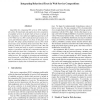Free Online Productivity Tools
i2Speak
i2Symbol
i2OCR
iTex2Img
iWeb2Print
iWeb2Shot
i2Type
iPdf2Split
iPdf2Merge
i2Bopomofo
i2Arabic
i2Style
i2Image
i2PDF
iLatex2Rtf
Sci2ools
120
click to vote
ICWS
2009
IEEE
2009
IEEE
Integrating Behavioral Trust in Web Service Compositions
Algorithms for composing Web services (WS) traditionally utilize the functional and quality-of-service parameters of candidate services to decide which services to include in the composition. Users often have differing experiences with a WS. While trust in a WS is multi-faceted and consists of security and behavioral aspects, our focus in this paper is on the latter. We adopt a formal model for trust in a WS, which meets many of our intuitions about trustworthy WSs. We hypothesize predictors of a positive experience with a WS and conduct a small pilot study to explore correlations between subjects’ experiences with WSs in a composition and the predictor values for those WSs. Furthermore, we show how we may derive trust for compositions from trust models of individual services. We conclude by presenting and evaluating a novel framework, called Wisp, that utilizes the trust models and, in combination with any WS composition tool, chooses compositions to deploy that are deemed most tru...
Related Content
| Added | 08 Mar 2010 |
| Updated | 08 Mar 2010 |
| Type | Conference |
| Year | 2009 |
| Where | ICWS |
| Authors | Sharon Paradesi, Prashant Doshi, Sonu Swaika |
Comments (0)

